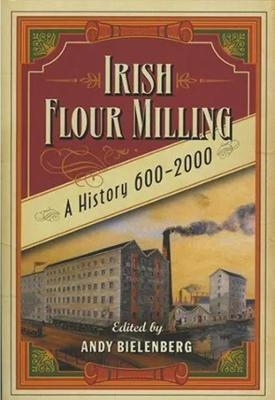
Irish Flour-Milling
A Thousand Year History
Seiten
2004
The Lilliput Press Ltd (Verlag)
978-1-84351-020-8 (ISBN)
The Lilliput Press Ltd (Verlag)
978-1-84351-020-8 (ISBN)
This book brings together a series of essays which illuminate the history of the Irish flour milling industry from the medieval period to the present day. Milling was one of Ireland’s foremost industries, playing a critically important role in the local economy of many districts, processing some of the key components in the Irish food supply.
This book brings together a series of essays which unfold and illuminate the history of the Irish flour milling industry from the medieval period to the present day. Milling was one of Ireland’s foremost industries, playing a critically important role in the local economy of many districts, servicing farmers needs and processing some of the key components in the Irish food supply. Despite being the most widely dispersed industry in the country, with bread and other milling components playing a central role in the Irish diet, the topic has not received the attention it deserves from social or economic historians, who’ve focused more on the potato. This book addresses that lacunae and incorporates a range of new research to form a compre-hensive overview. Attractively illustrated by a large collection of photographs and drawings, Irish Flour milling will be of particular interest to social, economic and local historians, industrial archaeologists, ethnologists and anthropologists, and the many people with family connections to the industry: Bolands, Hallinans and Hughes; Pollexfens, Russells, Odlums and Shackletons. Contributors include: Dr Colin Rynne (NUI, Cork), on the industrial archaeology of Irish flour milling from the medieval period to 1880; Professor Louis Cullen (Trinity College, Dublin), on eighteenth-century flour milling; Dr Andy Bielenberg (NUI, Cork), on flour milling during the Union; Dr Richard Harrison (historian), on the Quakers and Irish flour milling 1790-1930; Glynn Jones (author of The Millers), on the introduction of rollers into flour milling 1880-1925; Dr Akihiro Takei (Osaka Gakuin University), on the political economy of Irish flour milling 1922-45; and Norman Campion (milling consultant), on Irish milling since the Second World War.
This book brings together a series of essays which unfold and illuminate the history of the Irish flour milling industry from the medieval period to the present day. Milling was one of Ireland’s foremost industries, playing a critically important role in the local economy of many districts, servicing farmers needs and processing some of the key components in the Irish food supply. Despite being the most widely dispersed industry in the country, with bread and other milling components playing a central role in the Irish diet, the topic has not received the attention it deserves from social or economic historians, who’ve focused more on the potato. This book addresses that lacunae and incorporates a range of new research to form a compre-hensive overview. Attractively illustrated by a large collection of photographs and drawings, Irish Flour milling will be of particular interest to social, economic and local historians, industrial archaeologists, ethnologists and anthropologists, and the many people with family connections to the industry: Bolands, Hallinans and Hughes; Pollexfens, Russells, Odlums and Shackletons. Contributors include: Dr Colin Rynne (NUI, Cork), on the industrial archaeology of Irish flour milling from the medieval period to 1880; Professor Louis Cullen (Trinity College, Dublin), on eighteenth-century flour milling; Dr Andy Bielenberg (NUI, Cork), on flour milling during the Union; Dr Richard Harrison (historian), on the Quakers and Irish flour milling 1790-1930; Glynn Jones (author of The Millers), on the introduction of rollers into flour milling 1880-1925; Dr Akihiro Takei (Osaka Gakuin University), on the political economy of Irish flour milling 1922-45; and Norman Campion (milling consultant), on Irish milling since the Second World War.
The editor, Andy Bielenberg, lectures in history at National University of Ireland, Cork. He is author of Cork's Industrial Revolution (1991) Locke's Distillery (Lilliput, 1993) and The Irish Diaspora (2000), and edited The Shannon Scheme (Lilliput, 2002).
| Erscheint lt. Verlag | 21.1.2004 |
|---|---|
| Verlagsort | Dublin |
| Sprache | englisch |
| Maße | 156 x 234 mm |
| Gewicht | 500 g |
| Themenwelt | Geschichte ► Teilgebiete der Geschichte ► Kulturgeschichte |
| Geschichte ► Teilgebiete der Geschichte ► Technikgeschichte | |
| Sozialwissenschaften | |
| Technik ► Lebensmitteltechnologie | |
| ISBN-10 | 1-84351-020-0 / 1843510200 |
| ISBN-13 | 978-1-84351-020-8 / 9781843510208 |
| Zustand | Neuware |
| Haben Sie eine Frage zum Produkt? |
Mehr entdecken
aus dem Bereich
aus dem Bereich
der stille Abschied vom bäuerlichen Leben in Deutschland
Buch | Hardcover (2023)
C.H.Beck (Verlag)
23,00 €
vom Mittelalter bis zur Gegenwart
Buch | Softcover (2024)
C.H.Beck (Verlag)
12,00 €


